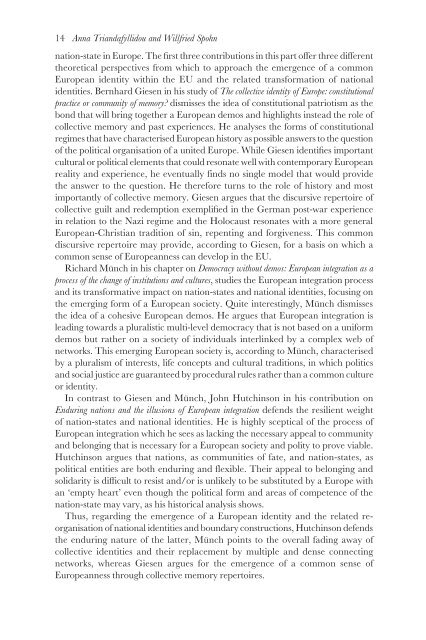Europeanisation, National Identities and Migration ... - europeanization
Europeanisation, National Identities and Migration ... - europeanization
Europeanisation, National Identities and Migration ... - europeanization
You also want an ePaper? Increase the reach of your titles
YUMPU automatically turns print PDFs into web optimized ePapers that Google loves.
14 Anna Tri<strong>and</strong>afyllidou <strong>and</strong> Willfried Spohn<br />
nation-state in Europe. The first three contributions in this part offer three different<br />
theoretical perspectives from which to approach the emergence of a common<br />
European identity within the EU <strong>and</strong> the related transformation of national<br />
identities. Bernhard Giesen in his study of The collective identity of Europe: constitutional<br />
practice or community of memory? dismisses the idea of constitutional patriotism as the<br />
bond that will bring together a European demos <strong>and</strong> highlights instead the role of<br />
collective memory <strong>and</strong> past experiences. He analyses the forms of constitutional<br />
regimes that have characterised European history as possible answers to the question<br />
of the political organisation of a united Europe. While Giesen identifies important<br />
cultural or political elements that could resonate well with contemporary European<br />
reality <strong>and</strong> experience, he eventually finds no single model that would provide<br />
the answer to the question. He therefore turns to the role of history <strong>and</strong> most<br />
importantly of collective memory. Giesen argues that the discursive repertoire of<br />
collective guilt <strong>and</strong> redemption exemplified in the German post-war experience<br />
in relation to the Nazi regime <strong>and</strong> the Holocaust resonates with a more general<br />
European-Christian tradition of sin, repenting <strong>and</strong> forgiveness. This common<br />
discursive repertoire may provide, according to Giesen, for a basis on which a<br />
common sense of Europeanness can develop in the EU.<br />
Richard Münch in his chapter on Democracy without demos: European integration as a<br />
process of the change of institutions <strong>and</strong> cultures, studies the European integration process<br />
<strong>and</strong> its transformative impact on nation-states <strong>and</strong> national identities, focusing on<br />
the emerging form of a European society. Quite interestingly, Münch dismisses<br />
the idea of a cohesive European demos. He argues that European integration is<br />
leading towards a pluralistic multi-level democracy that is not based on a uniform<br />
demos but rather on a society of individuals interlinked by a complex web of<br />
networks. This emerging European society is, according to Münch, characterised<br />
by a pluralism of interests, life concepts <strong>and</strong> cultural traditions, in which politics<br />
<strong>and</strong> social justice are guaranteed by procedural rules rather than a common culture<br />
or identity.<br />
In contrast to Giesen <strong>and</strong> Münch, John Hutchinson in his contribution on<br />
Enduring nations <strong>and</strong> the illusions of European integration defends the resilient weight<br />
of nation-states <strong>and</strong> national identities. He is highly sceptical of the process of<br />
European integration which he sees as lacking the necessary appeal to community<br />
<strong>and</strong> belonging that is necessary for a European society <strong>and</strong> polity to prove viable.<br />
Hutchinson argues that nations, as communities of fate, <strong>and</strong> nation-states, as<br />
political entities are both enduring <strong>and</strong> flexible. Their appeal to belonging <strong>and</strong><br />
solidarity is difficult to resist <strong>and</strong>/or is unlikely to be substituted by a Europe with<br />
an ‘empty heart’ even though the political form <strong>and</strong> areas of competence of the<br />
nation-state may vary, as his historical analysis shows.<br />
Thus, regarding the emergence of a European identity <strong>and</strong> the related reorganisation<br />
of national identities <strong>and</strong> boundary constructions, Hutchinson defends<br />
the enduring nature of the latter, Münch points to the overall fading away of<br />
collective identities <strong>and</strong> their replacement by multiple <strong>and</strong> dense connecting<br />
networks, whereas Giesen argues for the emergence of a common sense of<br />
Europeanness through collective memory repertoires.



